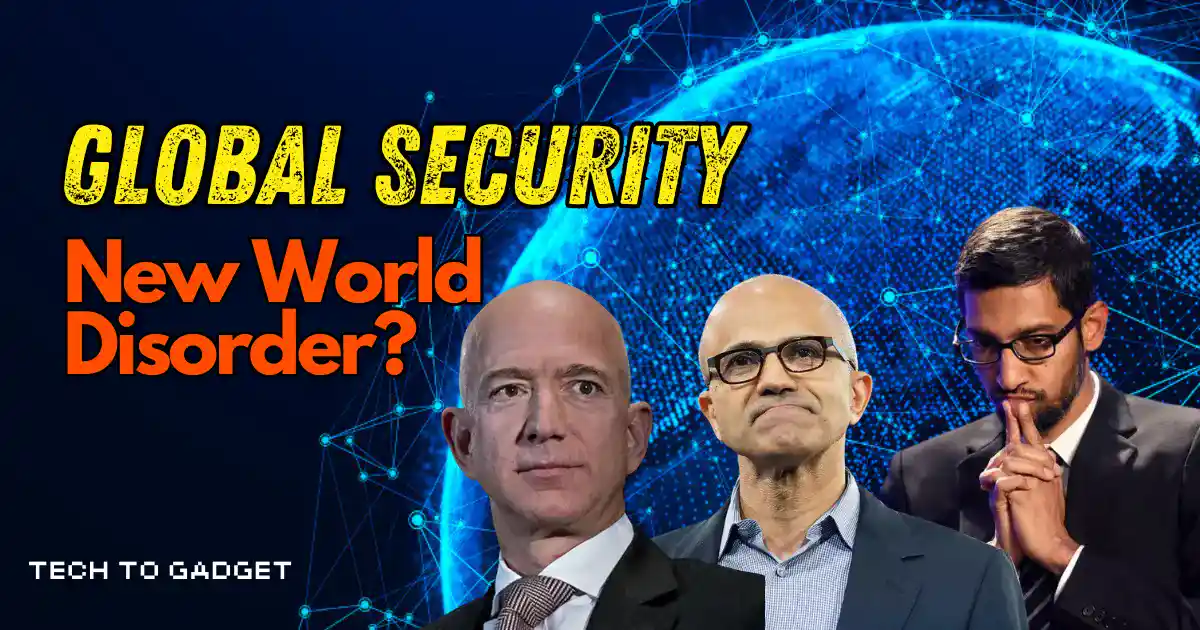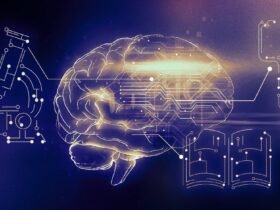Technology giants wield significant control over global security through their technological advancements and data capabilities. Their influence shapes cybersecurity measures and international policy decisions.
The role of technology giants in global security is pivotal. Companies like Google, Amazon, Apple, Meta, and Microsoft have resources and technologies that impact cybersecurity data privacy and the integrity of communication networks worldwide. These corporations are central in defending against cyber threats, managing data security, and even influencing the development of new security technologies.
Their involvement extends beyond corporate responsibility; they effectively set standards and influence global security policies. This control has sparked discussions about the balance of power between private entities and governmental bodies in securing both digital and physical realms. The strategic importance of these technology giants cannot be understated, as they play a crucial role in shaping the landscape of global security in the digital age.
Table of Contents
The Security Dominance of Tech Giants
Big tech companies have become the new guardians of global security in a time of growing digital dangers. These huge companies do not just sell software anymore; they also build security systems and have an impact on global cyber policies. Because they cover so much and have so many resources, they are the best at protecting digital settings.
The Rise of Big Tech in Safety Around the World.
The rise of Big Tech in global security is a story of new ideas, money, and power. These groups are well-positioned to deal with complicated security issues because they have access to a lot of data and the latest technology. Their solutions range from cybersecurity safety to finding threats with AI.
Influential People: The Parts of the “Big 5”
The Big Five tech companies—Google, Amazon, Facebook, Apple, and Microsoft—are at the forefront of this security paradigm. Each has its strengths, from cloud infrastructure to software platforms. Getting them involved is very important for making the digital future safe.
| Business | Focus on Security | Effects on a Global Scal |
| Safety of Data | High | |
| Best Buy | Cloud Safety | High |
| Privacy of Users | Moderate | |
| Apple | Safety of Devices | High |
| Windows 10 | Business Security | High |
Controlling data and worries about privacy

Technology giants have a lot of power when it comes to world security. They have power over much more than software and technology; they also control the huge amounts of data that move around in the digital world. But this power makes me very worried about data protection and personal privacy.
The new money is data as power.
In the digital age, data is more important than money. Big IT companies buy, analyse, and sell data constantly.
- This new currency takes into account personal information, spending habits, and user interests.
- Tech companies use algorithms to turn data into models that can predict what will happen, making ads and services more relevant to each person.
- Data breaches and unauthorised access are very dangerous to both individual and public safety.
Putting your privacy at risk: The price of convenience
Consumers often give up privacy to get the ease that technology offers. This trade has risks:
| Easy access | Risks |
| Smart things | Data security risk |
| Storage in the cloud | Possible leaks. |
| Profiles on the web | Theft of identity. |
Encryption and safe procedures become crucial for protecting customer data.
Legislation like the GDPR aims to give users control over their data. Nonetheless, striking the right balance between security and user experience is challenging.
Threats to cybersecurity and tech giants
Big tech companies shape our digital lives and hold the key to global cybersecurity. However, enormous power entails significant risk. Let’s examine how these behemoths handle cyber threats and their impact on global security.
The Double-edged Sword of Innovation
New technology brings both opportunity and threat. Every fancy gadget could be a hacking device. To keep ourselves safe, we need to understand this equilibrium.
- Smart devices connect us, but they also divulge information.
- Cloud services save data, but they can be compromised.
- AI learns to defend and attack simultaneously.
Handling Cyber Warfare as Corporate Responsibility
Tech titans are at the forefront of cyber defence. They must take steps to keep people safe and the digital environment secure.
- Update systems to fix security issues.
- Teach users how to detect and mitigate cyber threats.
- Collaborate with governments to tackle cybercrime.
Influence on International Affairs

Tech giants shape the world. Their impact goes beyond consumer electronics and has a huge impact on world events. They affect politics, business, and safety around the world.
Making security together with the government
Big IT companies help governments protect citizens and state secrets, improve national defence systems, and secure digital infrastructures.
- Sharing data between businesses and the government Finds dangers early.
- Joint cyber drills help people get ready for possible cyber risks.
- Expert talks make it easier for the government to protect itself online.
TTechnology’sHHanTechnology’stics The effect of tech companies is getting stronger and stronger until it is on par with that of several countries. Their technologies can change how politics work, and they have a say in how world policies are made.
What Technology Does for Geopolitics
Tech companies now have as much of an effect as some states. Their tools can change the outcome of elections, and they have a say in how world policies are made.
| Aspect | Influence |
| Communication | Platforms can control the flow of information. |
| Economy | Digital services have an effect on markets around the world. |
| Safety | How safe data is is affected by the standards for encryption. |
Risks of centralised security
It is important to discuss the risks of centralised security today. Tech giants control much of our online safety, which comes with many risks.
Why monopolies are bad for cybersecurity
When some businesses have a lot of power, they change how safe everyone is. This might not always be what people want. It is hard to choose and stop new tools and methods for security from being made when there are monopolies.
- When there is not as much competition, security gets better less often.
- Business may need to catch up, which will make things move more slowly.
Weak Spots in the System: When the Giants Fall
If a big player is having trouble, everyone is affected. One bug can cause many people all over the world to get sick.
| Trouble | Changes |
| The loss of data | There has been a breach of privacy. |
| No service at all | It is not possible for users to get to key features. |
This is a short list. Things can happen in the real world in many ways.
New Technologies and Fresh Problems
New tools are making it harder to keep the world safe. There are many big tech companies.
Using AI to keep things safe

How security is treated is changing because of AI (artificial intelligence). AI tools can look at data and find risks faster than people can, helping stop attacks before they happen.
- AI keeps an eye on things that act weird.
- It tries to guess when security could be broken.
- AI speeds up the time it takes to handle situations.
What Does the Quantum Leap Mean for Tech Safety?
Quantum computing has many safety issues. It is easy for quantum computers to break everyday encryption.
| Technology Right Now | What Quantum Computing Does |
| Encryption | Can quickly decrypt |
| The privacy of data | The risk of something happening goes up |
| How safe the network is | Needs new rules |
There needs to be quantum-resistant coding now. It will keep data safe from quantum threats.
What officials said and antitrust issues to think about
Digital giants have more control over global security than ever before, which is making more people call for strict rules and trade considerations. Regulators all over the world find it hard to find the right balance between promoting new ideas and making sure the market is fair. This part looks into how the government is dealing with these problems.
Finding a balance between new ideas and rules
Though innovation makes progress possible, it can also lead to market dominance and less competition if it is not regulated. Governments must make rules that encourage technological progress while stopping monopolies. This exact balance is needed for a market to grow and be competitive, which is good for both businesses and consumers.
- Set clear rules to encourage fair play.
- Help new businesses and startups come up with new ideas.
- To avoid problems before they happen, keep an eye on how the market is moving.
Antitrust laws: Keeping the big companies in line
Laws against unfair competition are the only way to ensure that no one company controls a market completely. These rules break up monopolies, promote a range of products, and ensure that customers are charged fairly.
| Action on Antitrust | How it affects tech giants. | What happened for customers |
| Merger review | Stops too much consolidation. | Better rates and more choices. |
| Rules for Market Dominance | Limits actions that hurt competition. | Helps with creativity and variety. |
| Enforcement of Data Portability | Customers can quickly switch providers. | Allows consumers to choose. |
Regulators, tech companies, and consumers are constantly arguing about how to make technology work for everyone, not just a few.
What is Next for Global Security
With the progress of technology, the picture of global security changes too. Big companies in the tech industry now control a lot of data and infrastructure, which makes people worry about their privacy and safety. How these powers are checked and balanced will determine the future of world peace. Let us look at situations where security is spread out and shared by more than one group.
Moving security away from one place: a step forward
More and more people are interested in the idea of decentralised security. It means handing over control from a few big companies to a network with more nodes. Attackers may not be able to get into security systems as easily with this method, which also makes sure that no one person or group has too much power.
- Because it can make things clear and stop fraud, blockchain technology could be very important in this transition.
- Distributed ledger systems can handle single points of failure, making cyberattacks more difficult.
Giving smaller groups more power in the security world
Giving smaller groups more power will require teamwork and new ideas. These actors can bring new ideas to the table, which can lead to better security solutions.
- Smaller security groups can come up with unique solutions that bigger companies might miss if they are encouraged to grow.
- Investing in cybersecurity education will result in a well-informed workforce ready to handle evolving threats.
Adopting these strategies makes the future of global security appear more inclusive and robust. The move to a decentralised paradigm is not only possible; it must result in a safer society.
Questions People Ask Often.
How does technology affect safety around the world?
Technology enhances global security by enabling better monitoring, cyber defence systems, and real-time communication; however, it also introduces risks such as cyber warfare and data breaches.
Why is it important to feel safe around the world?
Global security encompasses efforts to promote world peace and stability. Its importance lies in protecting nations from conflict, terrorism, and cyber threats.
What does technology mean for you?
Data breaches, automation-induced job displacement, and increased cyber-attack risks are all examples of technological threats.
What Does Technical Security Mean in Cyber Security?
Technical security in cyber security refers to the use of various defensive techniques and technologies to protect computer systems, networks, and devices from unauthorised access or cyber threats.
How Do Technology Giants Affect Global Security?
Because of their control over data, digital infrastructure, and sophisticated platforms, tech behemoths have a significant impact on global security, influencing privacy, information flow, and even election results.
What Risks Do Tech Giants Pose to Security?
Data breaches, spying, misuse of personal information, and potential collaboration with governments all have the potential to jeopardise individual liberties and privacy.
How do tech behemoths handle cybersecurity?
Strong safeguards, regular system updates, advanced encryption, and specialised teams focused on protecting user data and preventing unauthorised access keep tech behemoths’ cyber security in check.
What Role Do Technology Giants Play in Cyberwarfare?
Tech behemoths play a dual role in cyber warfare: they are targets of attacks due to their massive data repositories, but they are also key players in developing cybersecurity solutions to combat such threats.
Can tech behemoths avoid cyberattacks?
Tech behemoths can mitigate cyber threats by implementing advanced security protocols, investing in threat detection systems, and collaborating with other organisations to improve overall cybersecurity measures.
How Do Technology Giants Handle Data Privacy?
Tech behemoths manage data privacy by implementing data protection policies, employing encryption, and adhering to regulations such as GDPR, but their processes are frequently criticised for adequacy and ethical concerns.
Conclusion
Their influence is evident when we consider the power of technology behemoths over global security. These behemoths shape security measures that we encounter on a daily basis. Their roles in protecting data and infrastructure must be balanced. Navigating this landscape necessitates being aware of and engaged with its rules and practices.
Let us strike a balance between innovation and privacy in our digitally connected world.









Leave a Reply